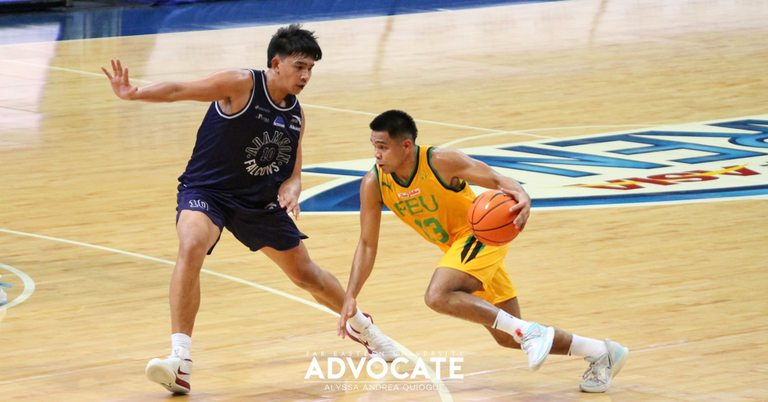
Langit, Lupa, Gobyerno!
- September 13, 2025 16:51
FEU Advocate
September 04, 2025 12:44

IGNIS
By Randy Espares Jr., Senior News Writer
It is a very fortunate situation when a big event at Far Eastern University (FEU), like ‘Tatak Tamaraw,’ coincides with the release of a new issue by the official student publication. With more students on campus, the newspaper’s stories have a wider reach and greater chance of being amplified. However, rather than being flipped through by hands and read by eyes, it was feet stomping on it that caught my attention.
For those unaware, FEU Advocate has served as the official student-led publication of FEU since its establishment on June 12, 1934. Originally an unnamed 10-page tabloid, the newspaper has weathered numerous challenges, including its abrupt closure during the Marcos Sr. Martial Law administration in the Philippines and the recent pandemic that forced media to adapt to a shifting landscape.
Its survival is partly because of the student-journalists who kept the fire burning.
The publication, through its mantra, ‘Veracious reportage and principled advocacy,’ has gone and served to be the voice of the students. In fact, it often goes beyond the four walls of the University just to report not only for the academe, but also for those who are continuously oppressed and marginalized.
Quoting the publication’s name, to advocate—that is what the organization has always strived to do.
So it’s a no-brainer to distribute where there are more people present. After all, Tatak Tamaraw introduces to freshmen what kind of an institution FEU is, and that includes the thriving free press it supports.
However, rather than being seen as a tool of information or a chronicle of past events, images I saw from colleagues distributing the newspapers showed the sheets on the ground, used as covers for wet barriers, as picnic blankets, and most disheartening of all, in the trash can, shredded and unread.
As one of the writers and former Editor-in-Chief whose byline is in those papers, it is painful to see.
A typical FEU Advocate newspaper issue takes up months to be produced. Extensive topic pitching is held, evaluated by editors, and once approved, the grueling process of trying to reach out to people for interviews, the back-and-forth of editing, and the approval from the adviser is done.
Not to mention the managerial aspect of running a newspaper, the publication recently had to switch printing companies after its previous printer increased prices beyond what the FEU Advocate could afford. With its meager P15 publication fee per student, the organization is forced to stretch its resources and find alternative ways to publish just to make ends meet.
That is why when one student decides to crumple up a newspaper or use it as a floor mat, it is not just a piece of paper they are stepping on. It is months of hard work, fact-checking, interviewing, illustrating, layouting, and copyediting from student-journalists who have made it their job to air out campus issues without fear. The brave students who could have chosen silence but refused to—that is what is being stepped on.
The unfortunate situation could have also been brought by the timing and weather, but students could have just said “no”; our staffers are instructed not to be pushy when one refuses to be given a newspaper.
Some universities do not even get to have publications, or if they do, they are not sufficiently funded to produce newspapers. This is what the College Editors Guild of the Philippines, the oldest and only existing publication alliance in Asia-Pacific, has been actively advocating for—better aid and sustainable funding for university papers.
From 2023 to 2024, there have been 206 recorded cases of campus press freedom violations all over the country. 58 instances of censorship, 37 of withheld funds, and 35 administrative interventions.
Which is why support is needed more than ever, if not from the governing bodies, at least from the campus journalists’ fellow students. Since this apathy towards journalism is what enables the aforementioned campus press freedom violations.
Worldwide, print is starting to decline. There has been a huge shift to online media, and every newsgroup is adapting to that change, including FEU Advocate, which can be accessed through various social media platforms.
However, a physical paper serves as a reminder that there is an autonomous student-led group in FEU that continues to brave on and be the voice of the students despite its challenges.
Some would say that the print media is dying. But nonetheless, there are still people like FEU Advocate, that even on a campus level tries to practice the noble profession and holding the line as the fourth pillar of democracy, even without sufficient budget, one byline at a time.
(Photos by Sean Clifford Malinao, Aleena Louise Abad, and Franzine Aaliyah Hicana/FEU Advocate; Layout by Jeseth Chriselle Saygo)









